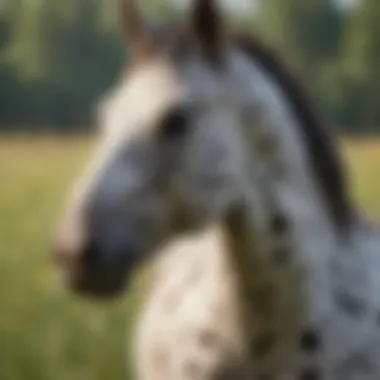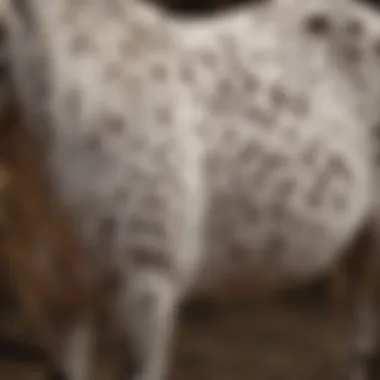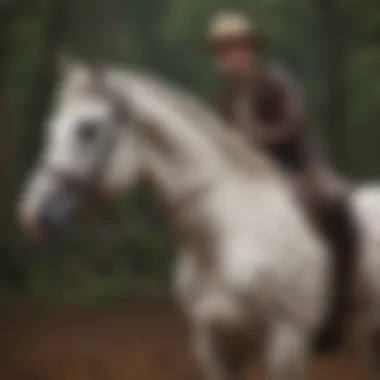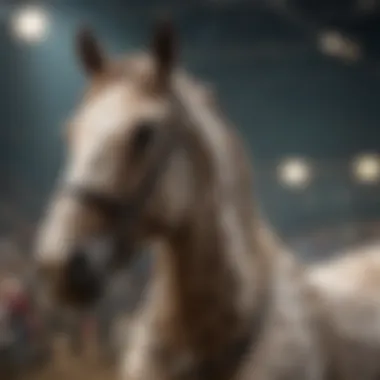Understanding Appaloosa Prices: Key Factors and Insights


Intro
Understanding the prices of Appaloosa horses requires a meticulous approach. These horses are not only distinguished by their striking appearance but also their unique lineage and characteristics that influence value. The market for Appaloosas is influenced by many factors, making it essential for potential buyers to grasp these nuances. In this article, we will explore various aspects that affect Appaloosa prices, including lineage, training, and geographical location. Additionally, we will look into current market trends and offer valuable insights for those considering acquiring an Appaloosa.
Pet Care and Grooming
While Appaloosas are often admired for their beauty and agility, the necessity for proper care cannot be overlooked. Regular grooming is vital for maintaining their health and appearance. Although not all grooming practices are universal, here are some important factors to consider:
Importance of Regular Care
Regular care for an Appaloosa ensures the horse remains healthy and comfortable. Grooming sessions facilitate the identification of potential health issues. Simple tasks like checking for wounds or skin irritations can prevent more severe conditions later.
Grooming Techniques by Pet Type
Grooming practices can vary depending on the horse's coat condition and length. For Appaloosas:
- Brushing: Use a soft brush to remove dirt and debris, followed by a stiffer brush for matted areas.
- Hoof Care: Regular hoof cleaning prevents problems. It's wise to check for stones or dirt lodged in the hooves.
Tools and Products Recommendations
Investing in quality tools can enhance your grooming routine. Recommended items for grooming an Appaloosa include:
- Stiff and soft brushes
- Hoof pick
- Mane and tail comb
Seasonal Care Tips
The climate can affect grooming needs. For instance, in warmer months, pay close attention to sweating and hydration. During winter, protect your Appaloosa from cold drafts and ensure it has adequate shelter.
Health and Nutrition
Understanding the health needs of an Appaloosa is crucial to ensuring long-term well-being. Nutrition plays a significant role in horse health and can impact overall performance.
Understanding Pet Nutrition
A balanced diet is essential for maintaining optimal health. Appaloosas typically require:
- Quality hay
- Grain or pellets for energy
- Minerals and vitamins to round out their diet
Common Health Issues by Species
While Appaloosas are generally robust, they can experience common health problems, including:
- Laminitis
- Colic
- Skin conditions related to their coat type
Preventive Care and Regular Check-Ups
Routine veterinary examinations can help identify conditions early. Schedule regular vaccinations and dental check-ups to establish a solid health protocol.
Food and Dietary Advice
Offering a proper diet helps prevent the onset of health issues. Always consult with a veterinarian about the best feeding practices for your horse’s age, weight, and activity level.
Behavioral Training
Proper training on Appaloosas can create a more harmonious relationship between horse and owner. Behavioral training encompasses understanding and addressing the horse's needs.
Basics of Positive Reinforcement
Positive reinforcement encourages desired behaviors without negative repercussions. Rewarding an Appaloosa with treats or praise when it follows commands strengthens the bond and enhances learning.
Training Techniques Users Can Apply
Using simple commands and the repetition technique is beneficial. Consistency in training ensures understanding and builds trust between the horse and handler.


Managing Behavioral Issues
Recognizing and addressing behavioral problems early on is essential. Issues like biting or refusing to move can stem from health problems or fear. Address such behaviors patiently and with care.
Importance of Socialization
Socialization with other horses and people is critical. Exposure to different environments helps an Appaloosa adapt to various situations, reducing anxiety and fostering confidence.
Engaging Activities and Enrichment
Keeping an Appaloosa active and engaged is essential for mental stimulation. Finding ways to entertain them can improve overall well-being.
Fun Games to Play with Your Pet
Incorporate games that encourage movement and agility. Simple activities like trail walking or barrel racing can be enjoyable for both you and the horse.
DIY Toys and Activities
Creating DIY toys can also be fun. Consider using empty barrels or tires for your horse to navigate through, stimulating their curiosity.
Importance of Mental Stimulation
Engaging activities prevent boredom. Explore various terrains or introduce new challenges during rides regularly.
Outdoor Adventures and Exploration
Exploration contributes significantly to an Appaloosa’s happiness. Whether through trails or open pastures, ensuring they have space to move is vital for their health.
Regular engagement through activities not only benefits the horse's physical health but its mental well-being as well.
Resources and Community Engagement
The journey of understanding Appaloosas does not end with purchase. Connecting with resources and communities can provide ongoing support and knowledge.
Recommended Books and Websites
To deepen your understanding, consider resources like:
- Wikipedia for general horse care: Wikipedia
- Britannica for health-related articles: Britannica
Forums and Groups for Pet Owners
Joining groups on platforms like Reddit or Facebook can provide invaluable insights and allow you to share experiences with fellow owners.
Finding Local Services and Classes
Research local vet services and training programs to enhance your skills in horse care and management. Class offerings often include grooming and training techniques.
Encouraging Community Sharing and Contributions
Participate actively within your local equestrian community. Sharing knowledge fosters camaraderie and aids in building a support network.
Prolusion to Appaloosa Horses
The Appaloosa horse, recognized for its distinct coat patterns and historical significance, represents a unique blend of beauty and utility. This section provides a foundational understanding of this horse breed, emphasizing its historical context and key characteristics. Recognizing these elements is crucial for potential buyers and enthusiasts alike. They help in appreciating what makes Appaloosas special and valuable in the equine market.
History and Origin
The origins of the Appaloosa horse can be traced back to the Nez Perce tribe of the Americas. Early contact with Spanish horses in the 16th century introduced them to various breeds, which were then bred selectively. The Nez Perce valued these horses not just for their physical traits but also for their capability and temperament. The breed’s distinct coloration is often attributed to a genetic mutation, leading to the mottled or spotted coats we see today. This history fosters a rich narrative surrounding the breed, and understanding its heritage can enhance buyers' appreciation and decision-making process.
Distinctive Characteristics
Appaloosas are easily identifiable due to their unique coat patterns, which can range widely in color. Some of the most common patterns include:
- Leopard spots: prominent spots against a white or lighter background.
- Blanket: a solid color with a cluster of spots.
- Roaning: a mix of colored and white hairs interspersed together.


Aside from their striking appearance, Appaloosas are known for their robust build and versatility. They are medium-sized horses, typically ranging between 14.2 to 16 hands high. Their strong legs and solid hooves make them suitable for various disciplines, such as trail riding, ranch work, and competitive events. Additionally, their calm and friendly temperament makes them ideal for families and novice riders. Being aware of these characteristics is essential for anyone considering the purchase of an Appaloosa, as they directly influence the horse's value in the market.
Understanding the history and characteristics of Appaloosas provides insights into their pricing dynamics and market trends.
Factors Influencing Appaloosa Prices
Understanding the factors that influence Appaloosa horse prices is essential for those looking to make a purchase. Prices can vary significantly depending on several aspects, which makes it necessary for buyers to conduct thorough research and analysis. This section will explore the key elements that affect pricing, offering valuable insights and considerations for potential horse buyers.
Pedigree and Lineage
Pedigree and lineage play a crucial role in determining the value of an Appaloosa horse. Horses with strong bloodlines often command higher prices due to their breeding history. Buyers should look for horses with proven performance records, both in competitions and as breeding stock.
A horse's lineage can indicate traits such as temperament, athletic ability, and physical conformation. Buyers should examine the ancestry of the horse to gauge its potential for future performance. Additionally, notable predecessors may enhance the horse's appeal and market value. Therefore, careful lineage research is necessary before making a decision.
Age and Health Status
Age also plays an important part in pricing Appaloosas. Younger horses, while they may have more potential for training and performance development, often come with an uncertainty regarding their long-term health and training history. Older horses, however, usually have health records and established training backgrounds, which can add value but may limit their competitive lifespan.
Health status is equally critical. Prospective buyers should seek horses with favorable health histories, including vaccinations, faring conditions, and regular veterinary check-ups. A thorough physical examination is vital to ensure the horse's overall health and to prevent unexpected costs related to health issues post-purchase.
Buyers should always request a veterinary check-up report before finalizing a purchase.
Training and Performance Quality
Training quality significantly affects the price of an Appaloosa horse. Horses that have undergone professional training, particularly in disciplines like dressage or jumping, are often valued higher. Performance quality in show rings can also add a premium to their price. Horses that demonstrate success in competitions attract buyers looking for proven talent.
Buyers should assess the training methods used and the results achieved. A horse that has shown consistent improvement in performance will likely hold its value better over time. It’s essential for buyers to understand what training has been applied and how that training aligns with their own goals.
Color and Markings
The color and markings of an Appaloosa horse are among the aesthetic components that influence pricing. While related to breed standards, unique colors or patterns can enhance marketability and thus, increase value. Appaloosas are recognized for their diverse color patterns, and distinctive markings can set a horse apart in the market.
Potential buyers must keep in mind that though color and markings can be key selling points, they shouldn’t be the only reasons for purchase. Judiciously consider if physical appearance matches your desired use for the horse.
Geographical Location
Geographical location impacts equine pricing as well. Prices may differ widely from one region to another due to supply and demand dynamics. In areas where equestrian activities are more prevalent, prices may be higher due to increased competition among buyers and available resources for horse care.
Additionally, local markets may favor specific types of horses based on regional preferences for disciplines. Buyers should explore local equestrian communities to understand better how location influences price trends and to identify the best places to find their desired Appaloosa.
Market Trends for Appaloosa Horses
Market trends play a crucial role in determining the prices of Appaloosa horses. Understanding these trends helps buyers gain insights into potential pricing fluctuations and what to expect in the market. By analyzing current conditions, price ranges, and the effects of show competitions, prospective owners can make well-informed decisions. This section will explore each of these elements in detail.
Current Market Analysis
The current market for Appaloosa horses indicates a stable interest among horse enthusiasts and collectors. Several factors contribute to this interest, including the unique characteristics of Appaloosas and their suitability for various equestrian disciplines. Analyzing market demand reveals that certain attributes, such as performance records and show results, directly correlate to higher prices.
Key Considerations in Market Analysis
- Demand Levels: Increased demand often leads to higher prices. For instance, Appaloosas with successful competition pasts tend to command more attention.
- Supply Constraints: A limited number of quality Appaloosas can increase their desirability, pushing prices up further.
- Economic Influences: Broader economic conditions affect discretionary spending, which can impact the horse market significantly.
Price Range Overview
In order to understand Appaloosa horse prices comprehensively, one must consider the range within which they typically fall. Prices can vary substantially depending on several factors, such as age, training level, and pedigree.
Typical Price Ranges
- Young or Untrained Horses: Prices can start from $1,000 to $5,000, depending on factors like basic training and health status.
- Trained Horses: Well-trained Appaloosas can range from $5,000 to $15,000, especially if they have competitive experience.
- Show Champions: Exceptional specimens winning major awards can be valued at $15,000 and above, reflecting their proven performance.
Prices fluctuate consistently based on market demand and trends, so it's essential for potential buyers to continuously analyze the market.
Impact of Show Competitions on Prices


Show competitions have a significant impact on Appaloosa pricing. Horses that compete successfully at reputable shows often see their market value rise. Winning titles or placing well in events can enhance a horse's pedigree in the eyes of buyers.
How Competitions Affect Pricing
- Enhanced Reputation: Horses with accolades attract more buyers, leading to competitive pricing in the market.
- Increased Visibility: Regular participation in events raises awareness and showcases the horse's abilities, which can lead to higher demand.
- Market Trends Influenced by Performance: Prices can increase sharply after a competition season, particularly if a horse performs exceptionally well.
Understanding the correlation between competition results and pricing can aid potential buyers in predicting future price adjustments.
Comparing Prices across Different Regions
Understanding the variances in prices of Appaloosa horses across different regions is crucial for potential buyers. The geographical location can significantly influence not only the price but also the availability of quality Appaloosa horses. This section aims to highlight various elements that contribute to these price differences and offers insights into how buyers can navigate these regional disparities.
Regional Price Variations
Prices of Appaloosa horses can differ vastly from one region to another. Factors such as local breeding practices, climate, and even cultural significance attributed to the breed play a role in these variations. For instance, areas with a rich history of Appaloosa breeding tend to have higher prices due to established reputations and availability of high-quality animals.
- Breeding Practices: Regions that prioritize quality breeding tend to drive higher prices due to the pedigree and lineage of the horses available.
- Local Demand: In places where Appaloosas are popular for recreational riding or competitive showing, you will see a spike in prices.
- Economic Factors: The overall economic status of a region can affect how much individuals are willing to pay for horses.
“Understanding regional variations helps buyers strategize their purchasing decisions effectively.”
In addition, prospective buyers should be aware that the prices may reflect not only the horse itself but also the additional costs often associated with transportation and care in different climates.
Availability and Demand Factors
The availability of Appaloosa horses and the demand for them in specific regions greatly influence pricing. Regions with a higher concentration of breeders usually have a larger selection, which can lead to competitive pricing. If availability is low and demand is high, prices are likely to rise.
- Competition: Regions with more events and competitions often see an increase in the presence of Appaloosas. These horses become more sought after, thus increasing their price point.
- Seasonality: Availability can fluctuate with breeding cycles. Buyers might find better prices during off-peak seasons when breeding is less active.
- Local Interests: Communities with strong interests in Western riding, rodeo, or endurance riding often maintain higher prices due to the desirability of Appaloosas in those activities.
When contemplating a purchase, it is essential to account for these factors. Understanding how regional dynamics play into Appaloosa pricing can lead to more informed decisions and potentially better deals.
Guidelines for Potential Buyers
Understanding how to navigate the complexities of Appaloosa horse purchases is crucial for any prospective owner. The price of these equines can vary widely based on multiple factors. Therefore, having a clear guideline aids buyers in making educated decisions. This section discusses the key aspects to consider when venturing into the Appaloosa market.
Evaluating Horse Purchase Options
When evaluating potential Appaloosa horses, it is important to consider various options as part of your buying strategy. This includes assessing individual horses based on their pedigree, health status, and overall suitability for your needs. Evaluate each horse's training level and performance history, as they can greatly impact future potential and pricing.
- Visit and Inspect: Personal visits to farms or stables provide firsthand experience. Inspect the horse physically, check movements, and evaluate behavior under pressure. If possible, arrange for a professional to help assess the horse's suitability.
- Recommendations: Reach out to other Appaloosa owners or trainers for suggestions. Recommendations can lead you to reputable sellers and potential choices that may not be widely advertised.
- Consider Different Ages: Different age groups often have varying price points. Younger horses may be cheaper but may require more training. Older horses may be more expensive but typically are well-trained and reliable.
Understanding Seller's Reputation
The seller's reputation plays a significant role in the buying process. It guides trust and can directly correlate to the horse's condition and price. Understanding the seller's background will help raise awareness about what to expect.
- Research: Look into the seller's history within the Appaloosa community. Their participation in shows, breeding practices, and customer reviews can provide valuable insight. Online platforms such as reddit.com and facebook.com have groups where buyers discuss seller experiences.
- Ask Questions: Have a list of questions ready for sellers regarding the horse’s history, training, and health. A reputable seller should provide clear and detailed answers.
- Check References: Do not hesitate to ask for references from previous buyers. Speaking with others who have purchased from the seller can help ensure that you are making a safe investment.
Negotiating Prices
Negotiation is a common practice in horse purchasing, particularly within the Appaloosa market where prices can fluctuate based on various interacting factors. A clear strategy aids in achieving a fair price.
- Be Prepared: Gather all the necessary information about the horse you are interested in, including health records, training history, and any market trends in your area. This knowledge empowers you during discussions.
- Develop a Range: Have a set price range in mind but be flexible. This allows you to make reasonable offers while still considering seller expectations.
- Be Respectful: Remember that negotiation is a dialogue. Keeping communication respectful and professional encourages a more positive interaction.
Always stay informed and conduct thorough research. This minimizes risks and positions you for successful negotiations.
Final Thoughts on Appaloosa Pricing
Understanding the pricing of Appaloosa horses requires a nuanced approach. This article emphasizes how multifaceted factors influence price fluctuations in the horse market. Recognizing these elements empowers potential buyers to make informed decisions when considering Appaloosas.
Taking a Long-Term View
When looking at Appaloosa prices, it is essential to think beyond immediate costs. The investment in a horse should not only consider the purchase price but also future expenses. These may include veterinary care, food, training, and potential show fees.
- Value Over Time: Appaloosas have a reputation for longevity and versatility. Investing in a quality horse can yield returns in both enjoyment and, if managed correctly, potential resale value.
- Market Trends: Prices fluctuate based on market dynamics, such as demand and availability. A long-term perspective helps buyers gauge whether current pricing represents a good deal within the broader market context.
- Engagement in Community: Being part of the Appaloosa community increases one's ability to track trends and network with knowledgeable individuals. This can provide insight into both pricing strategies and investment returns.
The Importance of Research
Diving into extensive research is crucial for any potential Appaloosa owner. Understanding marketplace nuances pays dividends in making sound purchasing decisions.
- Evaluate Historical Prices: Examine historical pricing data for Appaloosas in your target market. This analysis reveals patterns that can guide your budget and expectations.
- Trusted Sources: Utilize reputable platforms, such as Wikipedia and Britannica, to gather information on breed standards and typical pricing.
- Consulting Breeders and Trainers: Engaging with credible breeders and trainers provides insights into specific horse qualities that may justify higher price tags. Their expertise can be invaluable in assessing both physical traits and behavioral characteristics.
“Knowledge is power, especially in a market as varied as that of Appaloosa horses.”















